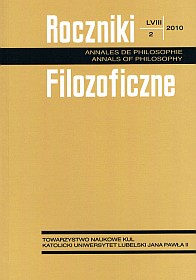Modalny rachunek nazw
Abstrakt
Sentences with the form: x is δ y, where δ is one of the modal operators (of the n/n category) is usually interpreted as rendering modalities of the de re type, as contrary to sentences included in the scheme: ΔP(x), where the modal operator Δ (of the s/s category) is semantically ambiguous (de re or de dicto). In literature treating modality as de dicto modality dominates. This results mainly from the fact that modal calculi are practiced mainly as sentential calculi, built over the classical sentential calculus, where – in the nature of things – the structure of sentences is not analyzed. We also have some extensions of elementary ontology (Lebedev’s) with the modal operator of the is-δ (s/nn) type as the primary operator.
In the article a construction is suggested, in which an operator of the δ (n/n) type is the primitive term. It is an elementary modal ontology that is an inferential extension of one of the mentioned systems, despite a formal simplification of its axioms.
Bibliografia
Bocheński I.M.: Z historii logiki zdań modalnych, Lwów 1938.
Kalinowski J.: Zdania modalne de re i de dicto. Przyczynek do porównania ujęcia średniowiecznego i współczesnego, [w:] Między logiką a etyką. Prace ofiarowane Profesorowi Leonowi Kojowi, Lublin 1995, s.19-27.
Kiczuk S.: O logice modalnej, „Roczniki Filozoficzne”, 52 (2004), s. 199-213.
Lebiediewa S.: The systems of modal calculus of names. I, „Studia Logica” 24(1969), s. 83-107.
Lebiediewa S.: The systems of modal calculus of names. II, „Studia Logica” 25 (1969), s. 79-95.
Lejewski Cz.: On Leśniewski’s Ontology, „Ratio” (Oksford), 1 (1958), s. 150-176. Wersja niemiecka: Zu Leśniewskis Ontologie, „Ratio” (Frankfurt a.M.), 1(1957/58), s. 50-78.
Prechtl P.: Leksykon pojęć filozofii analitycznej, przeł. J. Bremer, Kraków 2009.
Regner L.: Logika, Kraków 1973.
Słupecki J.: St. Leśniewskis calculus of names, „Studia Logica” 3 (1955), s. 7-70.
Copyright (c) 2010 Roczniki Filozoficzne

Utwór dostępny jest na licencji Creative Commons Uznanie autorstwa – Użycie niekomercyjne – Bez utworów zależnych 4.0 Międzynarodowe.





